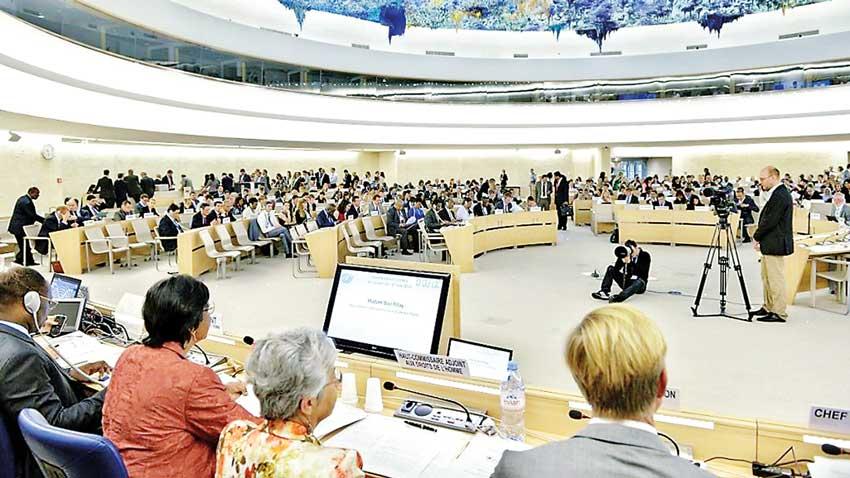25 Mar 2021 - {{hitsCtrl.values.hits}}

The Government in Sri Lanka was always unfased by the possibility of Western nations’ taking a hostile stance at the March session of the
UN Human Rights Council UNHRC) in Geneva
According to the resolution, the UNHRC will recognise the importance of preserving and analysing evidence relating to violations and abuses of human rights and related crimes in Sri Lanka
Johannes Huisman, the Director-Programme Planning and Budget Division of the Council, communicated that the adoption of the draft resolution would give rise to the total requirements of $2,856,300 for the OHCHR to implement its provisions
It means for the implementation of the resolution, the UN system has to complete another step. This has placed fresh challenges for the Sri Lanka to consider technicalities involved in the UN system in this regard
 The adoption of the resolution L.1/Rev.1 by the United Nations Human Rights Council (UNHRC) on Tuesday has paved the way for enhanced UN monitoring on Sri Lanka. The UNHRC has adopted resolutions critical of Sri Lanka since 2012, but the latest one is the strongest even with provisions seeking to enhance the capacity for the Office of High Commissioner for Human Rights (OHCHR) to increase monitoring and reporting on the situation of Sri Lanka.
The adoption of the resolution L.1/Rev.1 by the United Nations Human Rights Council (UNHRC) on Tuesday has paved the way for enhanced UN monitoring on Sri Lanka. The UNHRC has adopted resolutions critical of Sri Lanka since 2012, but the latest one is the strongest even with provisions seeking to enhance the capacity for the Office of High Commissioner for Human Rights (OHCHR) to increase monitoring and reporting on the situation of Sri Lanka.
It calls for the establishment of a mechanism for gathering, preserving and analysing evidence related to human rights and accountability issues for prosecutions in the future.
According to the resolution, the UNHRC will recognise the importance of preserving and analysing evidence relating to violations and abuses of human rights and related crimes in Sri Lanka with a view to advancing accountability, and decide to strengthen in this regard the capacity of the Office of the High Commissioner to collect, consolidate, analyse and preserve information and evidence and to develop possible strategies for future accountability processes for gross violations of human rights or serious violations of international humanitarian law in Sri Lanka, to advocate for victims and survivors, and to support relevant judicial and other proceedings, including Member States with competent jurisdiction.
The resolution requests the OHCHR to enhance its monitoring and reporting on the situation of human rights in Sri Lanka, including on progress in reconciliation and accountability and to present an oral update to the Human Rights Council at its forty-eighth session as well as a written update at its forty-ninth session and a comprehensive report that includes further options for advancing accountability, at its fifty-first session, both to be discussed in the context of an interactive dialogue.
Johannes Huisman, the Director-Programme Planning and Budget Division of the Council, communicated that the adoption of the draft resolution would give rise to the total requirements of $2,856,300 for the OHCHR to implement its provisions.
He said the related provisions had not been included under the programme budget for the year 2021 nor in the proposed programme budget for 2022. Accordingly, should the Council adopt draft resolution A/HRC/46/L.1/Rev.1, the related additional one-time requirements of $2,856,300 would arise, including $ 736,500 under section 24, Human rights, of the programme budget for 2021, and $55,400 under section 2, General Assembly and Economic and Social Council affairs and conference management, and $2,064,400 under section 24, Human rights, of the programme budget for 2022.
It means for the implementation of the resolution, the UN system has to complete another step. This has placed fresh challenges for Sri Lanka to consider technicalities involved in the UN system in this regard.
It will entail a whole lot of work for Sri Lankan leaders and diplomats to explore how the UN system functions in the allocation and approval of moment for such operations.
An immediate impact of the resolution is unlikely as a result, but things will move on.
The resolution was adopted with 22 votes in favour, 11 against and 14 abstentions. The voting pattern is interpreted in different ways. The groups and individuals that back the resolution hail it as a victory. At the behest of the Government of Sri Lanka, 11 countries voted against the resolution. In other words, 24 countries have not supported the resolution. Minister Gunawardane saw this as a gain for Sri Lanka though the resolution was adopted. However, abstention means a neutral position. In reality, some abstentions were a defeat for Sri Lanka whereas others a gain. Japan, as a country, abstained from voting this time was the case every time a resolution was taken at the UNHRC on Sri Lanka after the war concluded in 2009. Japan – Sri Lanka relations soured somewhat in recent times after the government scrapped Japan-financed Light Rail Project and reneged from the MoU signed by the previous regime with Japan and India to develop the East Container Terminal. Despite that, Japan did not vote for the resolution critical of Sri Lanka. In that sense, Japan’s abstention is a victory and upholding of its consistent position in this regard. Definitely, as a western ally, Japan would have come under heavy pressure to vote in favour.
Islamic countries
Some of the Islamic countries such as Bahrain and Indonesia abstained this time. It was a real loss because they were the traditional supporters of Sri Lanka at international fora. The countries that belong to the Organisation of Islamic Cooperation (OIC) took such a position because of Sri Lanka’s mandatory cremation policy. Despite reversal of the policy and President Gotabaya Rajapaksa and Prime Minister Mahinda Rajapaksa engaging the OIC and the leaders of these countries, some Islamic countries did not listen this time. Only Pakistan, Uzbekistan and Bangladesh were the Muslim-majority countries that voted against the resolution at Sri Lanka’s request.
In this instance, Pakistan played a pivotal role and carried our rigorous campaigning against the resolution.
Making his statement ahead of the vote on Tuesday, Pakistan Permanent Representative to the UN in Geneva Khalil Hashmi questioned the request for allocation of additional US $ 2.8 billion for the implementation of the Operative Paragraph 6 of the resolution. He said it raises serious questions at a time when the OHCHR and the UNHRC faced serious liquidity problems. He also said the resolution failed to condemn crimes committed by the LTTE and shied away from a call for accountability of the LTTE, its financiers and sponsors.
The representative for the Philippines which voted against the resolution said the text was “driven by simplistic generalisations of complex conditions on the ground.
Bangladeshi Prime Minister Sheikh Hassina gave a firm assurance to Prime Minister Rajapaksa in Dhaka that her country would stand by Sri Lanka.
Sri Lanka sounds miffed by India’s abstention. Though India did not support the resolution, it fits well into Indian political interests - the implementation of the 13th Amendment to the constitution and operation of the nine provincial councils. This is India’s long standing position, and it is now a matter envisaged in the UNHRC resolution.
The countries that spoke in favour of Sri Lanka made mention of the UN General Assembly resolution 60/251 that created the UNHRC.
Chinese Ambassador in Geneva Chen Xu, in his remarks, said the work of the UNHRC should be guided by principles of, among other things, universality, impartiality, objectivity and non-selectivity.
“All parties should promote and protect human rights through genuine dialogue and cooperation, and refrain from double standards and politicisation of human rights. We maintain that all countries should abide by the purposes and principles of the Charter of the United Nations, respect the sovereignty and independence of other countries, and abandon the practice of interfering in other countries’ internal affairs, and undermining their sovereignty and international cooperation under the pretext of human rights,” he said.
The resolution serves as an eye opener for Sri Lanka to rationalise its foreign policy with a more and better focus on Latin America. With proper engagement with the countries in these regions, Sri Lanka can easily accommodate a few more on board. Attention is now drawn to increase the presence of Sri Lanka in these regions.
29 Nov 2024 5 hours ago
29 Nov 2024 6 hours ago
29 Nov 2024 7 hours ago
29 Nov 2024 7 hours ago
29 Nov 2024 8 hours ago